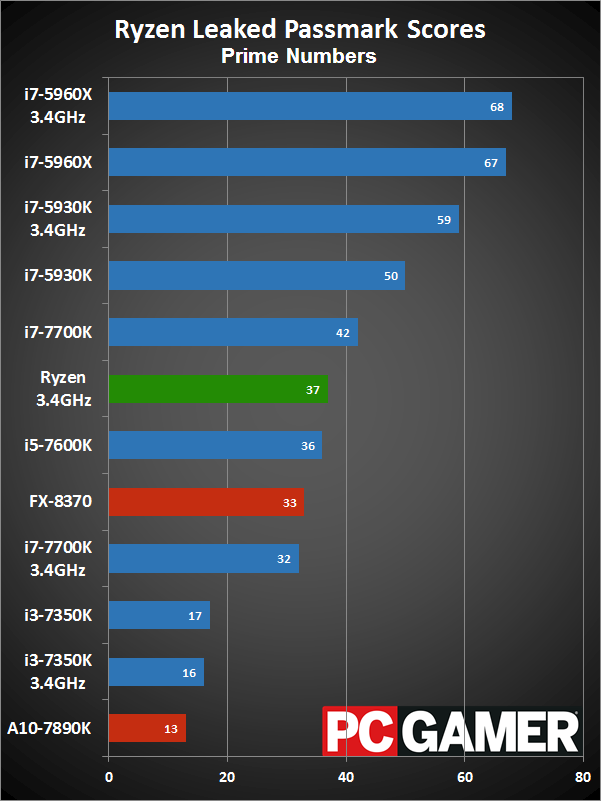OrangeKhrush
Senior member
- Feb 11, 2017
- 220
- 343
- 96
A 8c16t barely beats a 4c8t Intel. I think its doing badlyPrime numbers are still.better then kaby lake.
Y is he not here, he is usually everywhere.When juanrga appears all over its going to be bad. Expect nahelem IPC
Y is he not here, he is usually everywhere.
Any idea when those reviews are allowed to be published
I made a chart using your data:So interesting stuff, after about 25 fails to post and about 15 hard locks i found something that worked higher then DDR3-2000
...

I made a chart using your data:

In one test. 8c 16t has a lot over 4c 8t.A 8c16t barely beats a 4c8t Intel. I think its doing badly
In one test. 8c 16t has a lot over 4c 8t.
People really like hyperbole in here.
I made a chart using your data:

Any idea when those reviews are allowed to be published
IIRC Atkin sieve modulo operations are all by constants and so should be optimized away to faster operations by any decent compiler.From PassMark's website:
The Prime Number Test aims to test how fast the CPU can search for Prime numbers, reported as operations per second. A prime number is a number that can only be divided by itself and 1. For example, 1, 2, 3, 5, 7, 11 etc. This algorithm uses loops and CPU operations that are common in computer software, the most intensive being multiplication and modulo operations. All operations are performed using 64-bit integers. This test uses about 4MB of memory per core. The specific formula used for this test is the Sieve of Atkin with a limit of 32 million.
Emphasis mine. If these modulo operations are done using the DIV/IDIV opcodes, then it wouldn't be surprising to see them poorly optimized. These are very slow instructions even on modern Intel CPUs. I doubt that this would have been a high priority for AMD's development team, and it would not be likely to have a substantial impact on a wide variety of real-world software. Most applications that need high-speed division and modulus operations use various tricks to speed this up.
FYI, NDA lift is covered by the NDA
I know. I also know that he knows. I also know that he knows the answer to my question.

SO when is the NDA up??
Any thoughts on frequency and core count scaling?I made a chart using your data
Here's how the Ryzen chip fares against some other common CPUs—and I'll note that I've run PerformanceTest on my own systems here, with two options, stock and clocked at a static 3.4GHz (to match the Ryzen clock). (The AMD Ryzen, FX, and A10 results are from Passmark's database.)

All the rumors point to Feb 28th.
How about Feb 29th?
I kid, I kid...
LOL.... Don't jinx us jeez I dont wanna wait another day. all this suspense is killing me...How about Feb 29th?
I kid, I kid...
It's not one day.. it's 3 years. Boom Tiger Lake!LOL.... Don't jinx us jeez I dont wanna wait another day. all this suspense is killing me...
It's not one day.. it's 3 years. Boom Tiger Lake!


